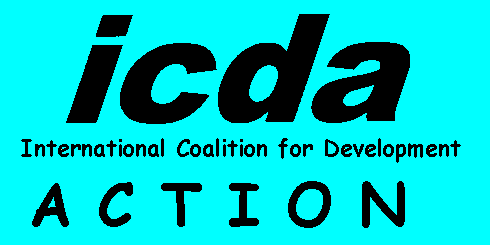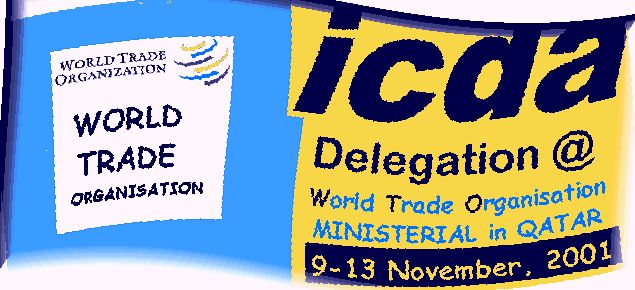
This site is best viewed with
| ICDA LATEST |
ICDA Latest News
Programme areas
ICDA History
| ICDA MEMBERS |
Current Members
| WTO IMPACT LIST |
Subscribe Here
What do you think?
| CENNT |
Latest News
IWGGT (in construction)
| PUBLICATIONS |
Latest ICDA Journal (in construction)
Latest ICDA Update (in construction)
| VACANCIES |
Internship
Book Keeper/Part time administrative Assistant
| HELP |
FAQ's
About Us
Contact Us

| REGIONAL TRADE >> ABOUT THE FTAA |
| By: FANWEB editors |
The Free Trade Area of the Americas (FTAA), currently being negotiated by 34 countries of the Americas, is intended by its architects to be the most far-reaching trade agreement in history. Although it is based on the model of the North American Free Trade Agreement (NAFTA), it goes far beyond NAFTA in its scope and power. The FTAA, as it now stands, would introduce into the Western Hemisphere all the disciplines of the proposed services agreement of the World Trade Organization (WTO) - the General Agreement on Trade in Services (GATS) - with the powers of the failed Multilateral Agreement on Investment (MAI), to create a new trade powerhouse with sweeping new authority over every aspect of life in Canada and the Americas.
The goal of the FTAA is to impose the failed NAFTA model of increased privatization and deregulation hemisphere-wide. Imposition of these rules would empower corporations to constrain governments from setting standards for public health and safety, to safeguard their workers, and to ensure corporations do not pollute the communities in which they operate. Effectively, these rules would handcuff governments' public interest policymaking and enhance corporate control at the expense of citizens throughout the Americas. FTAA would deepen the negative effects of NAFTA we've seen in Canada, Mexico and the U.S. over the past seven years and expand NAFTA's damage to the other countries involved. The FTAA would intensify NAFTA's "race to the bottom": under FTAA, exploited workers in Mexico could be leveraged against even more desperate workers in Haiti, Guatemala or Brazil by companies seeking tariff-free access back into U.S. markets.
Essentially, what the FTAA negotiators have done, urged on by the big business community in every country, is to take the most ambitious elements of every global trade and investment agreement - existing or proposed - and put them all together in this openly ambitious hemispheric pact. From the beginning, the big corporations and their associations and lobby groups have been an integral part of the process. In the U.S., a variety of corporate committees advise the American negotiators and, under the Trade Advisory Committee system, over 500 corporate representatives have security clearance and access to FTAA negotiating documents. At the November 1999 ministerial meeting in Toronto, the Ministers of Trade of the Americas agreed to implement 20 "business facilitation measures" within the year in order to speed up customs integration.
Further pressure has been placed on obtaining a successful FTAA in the light of the defeat of the Multilateral Agreement on Investment (MAI) at the first ministerial meeting of the WTO in 1996 and at the Organization for Economic Cooperation and Development (OECD) in 1998, and the shut-down of the "Millennium Round" meeting of the WTO in Seattle in December 1999. In fact, WTO officials are finding it difficult to even secure a venue for a new Ministerial meeting. As well, APEC - the Asia Pacific Economic Cooperation Forum - is faltering and few have expectations that it will make thehoped-for breakthrough to become a free trade and investment zone.
Many trade observers and pundits have identified the FTAA as the natural heir of these failed projects and are fearful that another such failure could put the whole concept of these massive free trade agreements on the back burner for years. In fact, in a January 2000 statement, Associate United States Trade Representative Peter Allegeier said that the FTAA has taken on new importance after the fiasco in Seattle and may well aspire to go further than the WTO, freed of the need to play the deals off against one another.
Please click here to go back to WTOMC Page
Copyright ©E.K.BENSAH II PRODUCTIONS. 1998-2001